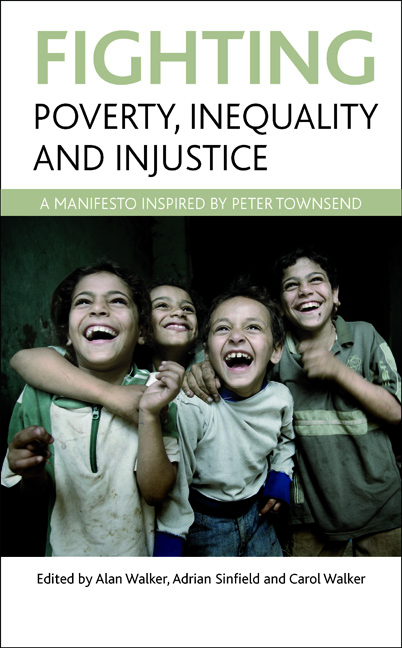Book contents
- Frontmatter
- Dedication
- Contents
- List of figures and tables
- Preface
- Notes on contributors
- one The legacy of Peter Townsend
- two The making of a pioneer researcher: reflections from Peter Townsend’s life story
- three Peter Townsend, a man ahead of his time: re-reading The family life of old people and The last refuge
- four The case for universal child benefit
- five Poverty
- six Social justice for children: investigating and eradicating child poverty
- seven For universalism and against the means test
- eight Underclass, overclass, ruling class, supernova class
- nine Addressing health inequalities: building on Peter Townsend’s legacy
- ten Towards a new sociology of ageing: from structured dependency to critical gerontology
- eleven Disability: prospects for social inclusion
- twelve Putting the lawyers in their place: the role of human rights in the struggle against poverty
- thirteen Radicalising social policy in the 21st century: a global approach
- fourteen Conclusion: building on the legacy of Peter Townsend
- Index
ten - Towards a new sociology of ageing: from structured dependency to critical gerontology
Published online by Cambridge University Press: 01 September 2022
- Frontmatter
- Dedication
- Contents
- List of figures and tables
- Preface
- Notes on contributors
- one The legacy of Peter Townsend
- two The making of a pioneer researcher: reflections from Peter Townsend’s life story
- three Peter Townsend, a man ahead of his time: re-reading The family life of old people and The last refuge
- four The case for universal child benefit
- five Poverty
- six Social justice for children: investigating and eradicating child poverty
- seven For universalism and against the means test
- eight Underclass, overclass, ruling class, supernova class
- nine Addressing health inequalities: building on Peter Townsend’s legacy
- ten Towards a new sociology of ageing: from structured dependency to critical gerontology
- eleven Disability: prospects for social inclusion
- twelve Putting the lawyers in their place: the role of human rights in the struggle against poverty
- thirteen Radicalising social policy in the 21st century: a global approach
- fourteen Conclusion: building on the legacy of Peter Townsend
- Index
Summary
Introduction
Peter Townsend can rightly be viewed as both the founder in the UK of the sociology of ageing and in his writing in this area a key figure in the development of what came to be known as ‘critical perspectives’ on ageing. The purpose of this chapter is to set out both a manifesto for developing new approaches to work in the field of ageing and in particular that relating to ‘critical gerontology’ (Estes et al, 2003; Baars et al, 2006a; Bernard and Scharf, 2007). The chapter is divided into five main sections:
• an examination of a central element of Townsend's contribution to work in the field of old age, namely, his development of ‘structured dependency’ theory;
• an exploration of the development of critical perspectives in gerontology, locating these in the context of sociological and related disciplines;
• the development of an analysis of key areas influencing the development of critical gerontology;
• the identification of new inequalities and divisions affecting the lives of older people;
• the presentation of a manifesto for change, focusing on three major areas for development.
From structured dependency to critical gerontology
In 1981, in the first issue of the journal Ageing and Society, Peter Townsend contributed what was to become a highly influential piece of writing dealing with the social and economic inequalities facing older people. This article – ‘The structured dependency of the elderly: a creation of policy in the twentieth century’ – represented a systematic attempt to provide a new theoretical framework for understanding policies affecting elderly people. Certainly, its publication in 1981 proved to be a watershed in sociological and critical thinking about ageing. Prior to this time, research had focused, as Townsend observed (1981, p 6), on ‘individualistic instead of societal forms of explanation’ or ‘acquiescent functionalism’, as it was described. Townsend, however, challenged this approach, arguing that it was social processes that created: ‘… the framework of institutions and rules within which the general problems of the elderly emerge and, indeed, are manufactured’ (p 9). For Townsend, in common with a number of other writers developing work on ageing around this time (cf Estes, 1979; Walker, 1980), the marginalisation and dependency of older people could more properly be viewed as ‘socially created’, a product of forced exclusion from work, poverty, institutionalisation and passive forms of community care.
Information
- Type
- Chapter
- Information
- Fighting Poverty, Inequality and InjusticeA Manifesto Inspired by Peter Townsend, pp. 193 - 222Publisher: Bristol University PressPrint publication year: 2011
